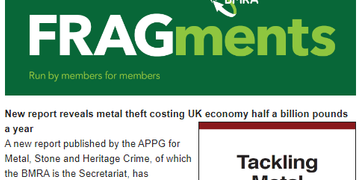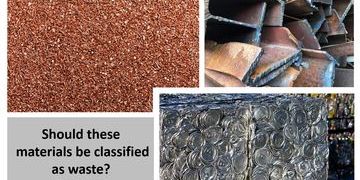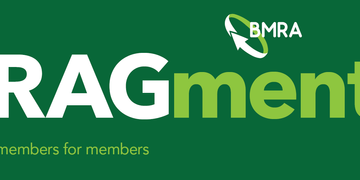TOMRA addresses the challenge of rising export costs and long-term sustainability post China’s New National Sword Standard.
BMRA members TOMRA Sorting Recycling (TOMRA) has released an e-book aimed at addressing the challenge of China’s New National Sword Standard. Requiring purity levels that are now 99.5 percent rather than the previously accepted 90-95 percent, the standard is anticipated to expand to include a total of 16 materials by the end of this year and then a further 16 additional materials by the end of 2019. Yet the business sustainability to manually sort the material suitable for China, while initially may seem like a small investment, could potentially cost more, reduce productivity and income. They also investigate how metal recyclers may need to divide waste exports between multiple countries, increasing sales and transportation costs.
Below is an opinion piece from TOMRA about the New National Sword Standard.
TOMRA Sorting Recycling publishes e-book to help recycling operations meet China’s New National Sword Standard.
TOMRA Sorting Recycling has published an e-book containing advice on how to meet the tough new rules for sending recyclable materials to China. The e-book aims to address widespread concerns about China’s National Sword standard, introduced to the World Trade Organisation in July 2017 and fully implemented on 1st March 2018, which demands higher purity levels in recyclable materials entering the country. This standard is anticipated to expand to include a total of 16 materials by the end of this year and then a further 16 additional materials by the end of 2019.
China is the world’s largest importer of recycled material and National Sword has sent shock waves through the recycling industry, requiring most recyclable material arriving in China to have purity levels of greater than 99.5 per cent. This is a significant increase from the 90-95 per cent purity levels previously accepted, and will have far-reaching consequences.
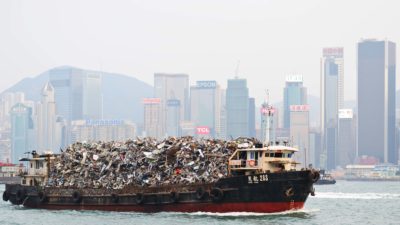
The Chinese Government has threatened to reject all material that fails to meet the new limits, with all shipment containers being x-rayed or opened by Chinese officials on arrival. Just recently, TOMRA Sorting was approached by a recycling company when a number of its containers of paper were returned to the UK from China having failed to meet the requirements. UK metal processors face the same risks: if they can’t meet the new lower contamination levels, their shipment will be repatriated back to the UK, the costs for which would have to be covered by the processor or producer. And, at an estimated cost of £20k per container, those companies that export a few containers a month face exorbitant charges, not to mention the unwanted, but inevitable attention from the Environment Agency when their shipments get stopped at the dock!
Although non-ferrous metals don’t feature on the nation’s list of banned materials, its permitted contamination limit has dropped from 5 per cent to just 1 per cent. The previous 5 per cent contamination limit for non-ferrous metals was challenging enough for UK metal processors to meet, but the drop to just 1 per cent is going to be nigh on impossible to achieve, particularly for those who rely on traditional metals recycling processes.
There will be some metal processors who will have resigned themselves to the fact that they simply won’t be able to meet the lower contamination limits and will, instead, have no option but to find alternative end markets for the material, which will inevitably mean reduced revenue. But for others, that are heavily dependent on China as an export market, the only option is to invest in a solution that ensures their material is accepted.
Historically, recycling companies have used manual or sink-float treatments to sort mixed non-ferrous metals, but these methods are limited in their success and generally have higher operational costs. Manual sorting has lower limit in terms of material recovery as smaller metal parts under 20 mm and wires can’t be easily sorted by hand or if they are, require a large amount of time and effort. Optically indistinguishable metals also can’t be sorted manually and are therefore lost. Sorting by colour is also impossible for identically coloured materials, such as the all-grey metals of aluminium alloys, stainless steel, zinc and lead.
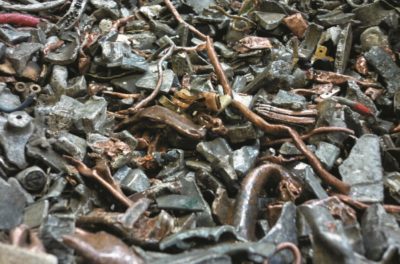
Other metal recyclers use sink-float processes, also known as dense media plants, to separate metals with different densities, an example being separating aluminium from other non-ferrous metals. This process requires large amounts of water and other expensive additives, the processing and disposal of which represent an additional burden to the environment. In terms of productivity, the sink-float method can only separate materials with different densities. The valuable heavy metal mix of copper, brass, stainless steel and zinc presents an unsolvable problem for this method.
So, as well as being inefficient and uneconomical, these methods are incapable of achieving the required 99 per cent metals purity levels set by the Chinese Government. There is, however, a tried and tested, financially viable solution that enables metal processors to achieve 99 per cent purity of non-ferrous fractions. That solution is sensor-based sorting, an automated, low-maintenance sorting technology that uses colour, X-ray and near-infrared sensors to achieve superior precision with high throughputs and consistently top-quality end fractions.
There is, understandably, a lot of fear and uncertainty about what the future holds in light of the ever-tightening Chinese final product purity requirements, but in reality, UK metal processors only really have three options: invest in their facilities, find alternative markets or accept reduced revenue for their material.
TOMRA’s new free e-book, entitled ‘National Sword - No Need for Fear!’ can be downloaded at https://leads.tomra.com/ebook/press/.

